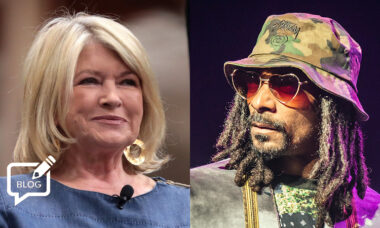 Celebrity endorsements for cannabinoid products have been growing increasingly mainstream. What was once the purview of more “controversial” or “alternative” names like Snoop Dogg, Kim Kardashian or Tommy Chong has now become the territory of mainstream celebrities and stars designed to appeal to a wider audience than ever before.
Celebrity endorsements for cannabinoid products have been growing increasingly mainstream. What was once the purview of more “controversial” or “alternative” names like Snoop Dogg, Kim Kardashian or Tommy Chong has now become the territory of mainstream celebrities and stars designed to appeal to a wider audience than ever before.
Martha Stewart (pictured, left) has just expanded her range of hemp-derived CBD products to include topicals after initially teaming up with Canopy Growth to launch a line of hemp-derived CBD “wellness supplements” with flavour profiles inspired by her favourite recipes. They include gummies, soft gels and oil drops.
In sports, UFC fighters and skateboarders have given way to golfers and Nascar drivers as hemp brands look to move beyond alternative consumers that may already be familiar with their products to previously untapped market segments. cbdMD has signed a bevy of professional golfers including Major winner Bubba Watson.
Meanwhile, racing driver Tyler Reddick recently signed an agreement to promote hemp-based cannabinoid brand 3Chi during the 2022 NASCAR Cup Series – particularly interesting as 3Chi specialises in a variety of more controversial and less mainstream hemp THC products including delta-8, delta-10 and even delta-6a10a THC lines.
This all shows how the face of CBD is rapidly changing. And conversations about using it are growing more mainstream. Stars that would not have discussed usage for fear of repercussions are becoming more frank.
Past time to ditch the stigma
Basketball star Kevin Durant announced a partnership between his multimedia company Boardroom and the cannabis technology firm Weedmaps last year. Commenting on the deal during an Out of Office podcast episode, Durant said: “I think it’s far past time to address the stigmas around cannabis that still exist in the sports world as well as globally.”
Durant claims that “the Band-Aid’s been ripped off” the social stigma and there is more open conversation around cannabis use in the league but there are still some concerns about the drug’s prior associations.
“There’s just a lot of stuff that’s being thrown into the pot that’s got a lot of guys wanting to not speak on it,” he said. “But the benefits of using cannabis throughout the season or off season, recovering from games and getting sleep [seem undeniable]… It’s hard to sleep when you’re travelling so much and you’re on the road so much and playing four basketball games throughout the six-month season.”
But if cannabinoid products are coming into the mainstream then where does that leave its original pioneers such as Snoop Dogg (pictured above, right)?
There also remains a separate, important, argument about why a musician – and it must be noted a non-white artist – so established he can perform in the Super Bowl half-time show is still labelled as risqué or alternative by many. But that is outside the scope of this discussion.
Who was there first?
In a recent interview with The Hollywood Reporter, Snoop Dogg voiced concerns that the modern-day cannabis industry isn’t inclusive to the people of colour who pioneered it.
“The people who were actually there before it was legal, when they were trying to find ways to create and build, they should be the ones that get the first opportunities, not the people with the most money,” said Snoop. “That’s the backwards way of doing it, and I think in the future it’s going to switch because it’s so accessible.”
He called for compensation for people of colour because it was more difficult for them to become licensed and get dispensaries if they had criminal records dating from the time when cannabis was illegal – a theme tying into the ongoing debate over the lack of impact of social equity programmes in state cannabis licensing – a topic of an upcoming CBD-Intel feature piece.
“They put so many different hurdles in front of us to where it becomes like an industry that’s not for us, but we do all the promoting of it, buying it and making it what it is,” he said.
“The millionaires have to understand that when you jump into our world, you’ve got to compensate us. You can’t just steal our shit and think we’re going to sit back and take that. We ain’t that generation. We feel like hip-hop and the culture in general, from jazz music to right now, has helped cannabis become most infamous for what it is.”
– CBD-Intel staff
Photos: Gage Skidmore / NRK P3







